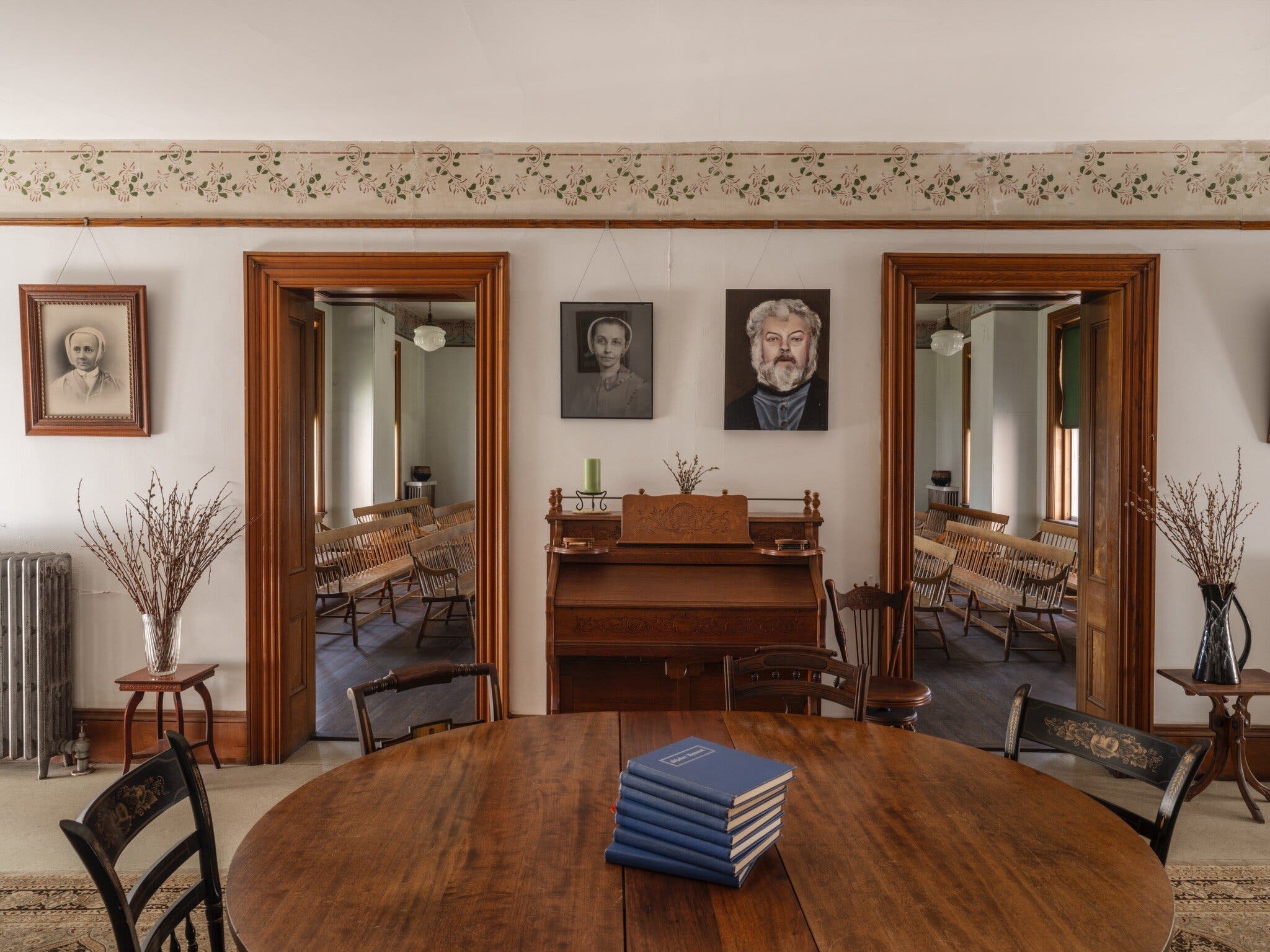Things changed; things carried - #398

This year, as the sun lifted in the sky and Winter gave way to Spring, I read Suzanne Skees's God Among the Shakers. Perhaps it was more the hopefulness of the lengthening days, but she and the Shakers peaked my curiosity. Rather than laughing at the gradual dying out of the celibate sect, I found something resonant about their total absorption into community life and religious practice. When traditional religion leaves so much to be desired, the relative newcomers are interesting.
And yet: the Shakers are almost done. The seven that Skees found in 2000 are down to an elderly two. The Times piece below reads like an early obituary of the religion. They have only an 86 year-old and a fellow in his late 60s: most of the community life is run by lay people. It's hard to know exactly what one can attribute this to. While some aspiring Shakers have come to Gray, Maine, to attempt the religious life, they mostly fall away. A religion that requires you to leave everything and move to a commune may not be built to last. A religion built solely on new converts won't grow in a post-religious culture. This got to thinking about change: what matters enough to keep the same? What matters so much that we should invite it to change?
Reading the interview with Brother Arnold, it's clear that to be a Shaker means to be of the 19th century. Their practices are rooted in that time—their commune is the ideal life, as imagined in the 1790s. It hasn't changed. If the short history in Skees's book is right, the other Shaker communities, the ones that folded in the 1950s and 70s, were even more resistant to change than the folks at Sabbath Day Lake. Becoming Shaker means trading modernity for antiquarian agriculture and renouncing all familial life. Had they been asked, the management consultants would've advised tweaking this formula.
The Shakers made no tweaks; now they are almost gone.
On the other hand, much of what frustrates me about traditional Christianity is its squabbling, bickering, and feuding as it slowly changes and adapts to the world as it is. We have any number of rifts, from the actual schisms to the bloggers's and clerics's seemingly perpetual internecine fighting. Reading anything religious almost inevitably leads you to some argument with bitterly dug-in sides, neither of which make much sense to the uninitiated. For example, over the summer the Anglicans in North America needed a new Archbishop, as the last one was retiring. In the lead-up meeting they held to nominate one, priests added their names to one online petition or another related to what the new leader had to do or not do to keep things a-ok. Most of these related to who was permitted to be in vs. out. People seem to like nothing more than drawing lines around themselves. None of the things fought about seemed all that important to your humble parishioner. In the end, the bishops seemed to agree, as they found a new top bishop not all that willing to engage with the petitions and line-drawing, who seems more focused on keeping the church alive.
On the other hand, the best thing I read this week is a well-written essay which finds William F. Buckley Jr. opining the loss of the traditional Latin mass. He makes no claims anyone understood it, how could you, really, but rather he found a personal religious practice better in it than in the participation-oriented services that replaced it. As entertaining as the essay is, I think it misses the point. What keeps any tradition alive, I think, is openness to change. You can't expect everyone to adopt a way of life from a few hundred years ago to properly live your religion; you can't expect them to keep a dead language alive simply in order to worship; the things that make old-timers happy probably won't satisfy the next generation. Things change. They have to. What matters is what each successive change keeps alive.
Cormac McCarthy, at the end of The Road, gets this exactly right. The apocalypse has come. Humanity is mostly reduced to barbarism. But the man and the boy have moved along the road for the whole book, eking out an honorable existence. The man is about to pass away and this is from the last dialog the man has with the boy:
You have to carry the fire.
I don't know how to.
Yes you do.
Is it real? The fire?
Yes it is.
And then, when the boy finds the other people:
How do I know you're one of the good guys?
You don't. You'll have to take a shot.
Are you carrying the fire?
Am I what?
Carrying the fire.
You're kind of weirded out, aren't you?
No.
Just a little
Yeah.
So are you?
What, carrying the fire?
Yes.
Yeah. We are.
...
The woman when she saw him put her arms around him and held him. Oh, she said, I am so glad to see you. She would talk to him sometimes about God. He tried to talk to God but the best thing was to talk to his father and he did talk to him and he didn't forget. The woman said that was all right. She said that the breath of God was his breath yet though it pass from man to man through all of time.
Reading
 There Are Only Two Shakers Left. They've Still Got Utopia in Their Sights.
There Are Only Two Shakers Left. They've Still Got Utopia in Their Sights.
Their numbers have dwindled, but the remaining members are imagining what comes next.
 Reflections on the Final Solution to the Latin Mass
Reflections on the Final Solution to the Latin Mass
William F. Buckley Jr. prayed that the new Mass would 'yield a rich harvest of informed Christians.' It required from him a strenuous act of faith.